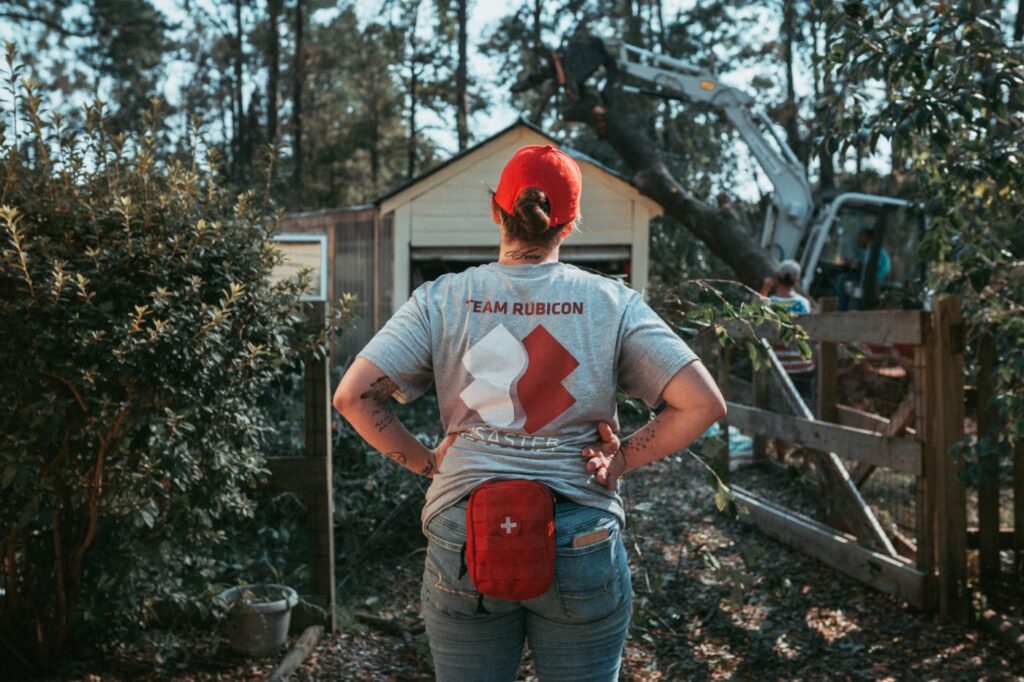Army veteran Julie Simmons, of Wilmington, North Carolina, thought she prepared thoroughly for storm season. She had saved for a long time from her substance abuse counselor salary to pay for a new roof on her single-story home and to have many of the trees on her property taken out or trimmed. She left two of the biggest, sturdiest trees intact, except for their branches being thinned.
As Hurricane Florence approached, Simmons’ granddaughter, who lived with her half the time, was safely tucked away in Philadelphia with Simmons’ daughter, and Simmons and her two bull mastiffs evacuated to her boyfriend’s house. She prayed everything would be okay. “I’ve been homeless before,” she said, “and my biggest fear is that I’d be homeless again.”
Sometime after September 14, 2018, when Hurricane Florence made landfall, its high winds brought down the giant oak in Simmons’ backyard, where it breached the roof and allowed water to flood into the ceilings, which then collapsed in half of the house.
On Saturday, after the storm abated, Simmons approached the home to assess the damage. At first, she was grateful to see her windows intact and the house’s exterior mostly damage free. She entered through the front door into the living room and everything still looked fine. She felt relief.
She made her way room by room and when she entered her bedroom and saw the ceiling had collapsed onto the floor and that her bed and furniture were soggy and ruined, she started and to cry, and by her own admission, “has been crying on and off for days.”
As a therapist, Simmons understands triggers and trauma. She said, “I know how this impacted me. It’s been a rough year. My car was totaled in May, so I don’t have a car right now and am driving a friend’s. And now this happened and it’s been overwhelming.”
In the storm’s aftermath, Simmons mentioned how suspicious she became because people kept knocking on her door trying “to scam her”, as she called it, into paying a lot of money for them to help her. When Team Rubicon knocked on her door, she was wary, but her fears were calmed when the TR team member told her they were there because she called the crisis number and left her information, and that their services were free. She cried then with a combination of grief and relief.
TR assessed the situation of her house, and then returned two days later with an entire team ready to do the work. Tim Miller, a TR volunteer who was on the team at Simmons’ house, said, “We are tearing down the ceiling, taking down all of the drywall on the walls, removing the carpet and subflooring in all of the rooms that were damaged. It’ll be a two-day job.” The team was attired in white hazmat suits and wore respirator masks as all of the damage had started to grow mold.

As the team worked, Simmons and her boyfriend moved her personal effects into one of the four rooms of her house that were dry and undamaged. Each time they wanted to move a piece of heavy furniture, the TR team moved it for them. The team also helped her moved damaged furniture to the curb in front of the house for a future garbage dump run.
When she stopped to take a break from all of the sorting and throwing things away, Simmons said, “After I left the army after eight years, my three-year-old daughter and I were homeless. I was trying to get a job. We had to stay in shelters. Rats ran along the floor all night. It was awful. I’m fine with losing my stuff, as long as I have a roof over my head. I don’t ever want to be homeless again.”
We sat on the living room sofa and she took a visual inventory of her surroundings. She pointed to the living room’s hardwood floors. “I installed those myself by watching YouTube videos.” She’s proud of how good they look and happy that they survived. She expressed gratitude that she and her dogs were out of the house and safe.
“I’ve been off work for more than a week,” she said. “And even though I’m in bad shape, I know I need to suck it up and go back to work because my clients really need me.” Simmons shifted into therapist mode, saying if she could give people one piece of advice at this time it would be: “Be careful what you tell people when they are going through a trauma. Don’t say ‘stop crying’ and ‘it will all be all right’. People need time and space to work through things in their own time.”
Simmons said once she gets through this, she plans to volunteer with Team Rubicon to help others after disasters. “I have heavy equipment operating experience and all kinds of skills,” she said. “I know how this impacted me,” and she’d like to have that kind of impact on others in need.



